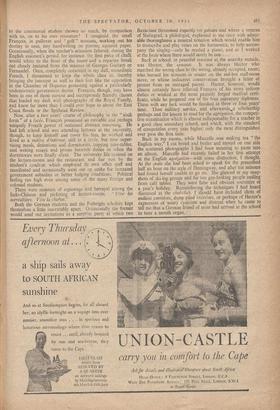"tai, Gai, L'Ecolier "
By C. STRICKLAND (Downing College, Cambridge) IEXPLAINED to Francois and Marcelle as we sat on the lawn by the Pepys Library that, although most of the people around us were aimed more or less comfortably at texts lying open on the grass, this was not the best spot one could choose for intensive study. A punt drifted by, decorously mishandled by a girl in a bright summer dress, and Francois nodded consolingly. " ca je corn prends tres bien," he said, " toujours le petit canard qui vient l'embeter." Perhaps he deserved his wisecrack, however, I remembered the dark Third Republic lecture rooms, the overcrowded students' restaurants, hostels and sanatoriums I had seen during my year in France, and, while I was being the Cam- bridge host. I found myself checking the promptings of a surely rather sanctimonious sense of guilt.
My friends listened with a rather wisiful admiration as I explained the system of individual supervision, and my un- easiness deepened. Was it admiration for or mere deference. to the continental student thrown so much, by comparison with us, on to his own resources? I imagined the small Francois, in pullover and " golf " trousers, working out his destiny in neat, tiny handwriting on porous, squared paper. Occasionally, when the teacher's attention faltered, during the English assistant's period, for instance, the first piece of chalk would whizz to the front of the room and a repartee break out closely imitated from the manner of Georges. Guetary or Fernandel. Once, completely outwitted in my dull, unsardonic French, I threatened to keep the whole class in, thereby bringing the innocent as well to their feet like the opposition in the Chamber of Deputies protesting against a particularly undemocratic government decree. Francois, though, may have been in one of those earnest and outrageously friendly classes that loaded my desk with photographs of the Royal Family, and knew far more than I could ever hope to about the East Coast floods or the Spithead Review.
Now, after a two years' course of philosophy in the " sixth form" of a lycee, Francois possessed an enviable and perhaps uniquely French power of sustained abstract reasoning. He had left school and was attending lectures at the ,university, though, to keep himself and cover his fees, he worked and lived as a maitre d'internat, still in a lycee, but now super- vising meals, detentions and dormitories, copying time-tables, and writing essays and proses between duties or when the dormitories were finally silent. The university life centred on the lecture-rooms and the restaurant and bar run by the student's syndicat, which employed its own office staff and manifested and occasionally went out on strike for increased government subsidies or better lodging conditions. Political feeling ran high even among some of the many foreign and colonial students.
There were rumours of espionage and. betrayal among the Indo-Chinese and picketing of lecture-rooms. " Vice les surrealistes. Vive la chaltut."
Both the German students and the Fulbright scholars kept themselves a little inscrutably apart. Occasionally the former would send out invitations to a surprise party at which two Bavarians thrummed expertly on guitars and where a veteran of Stalingrad, a philologist, explained to me once with admir- able thoroughness a musical notation which would enable him to transcribe and play tunes on the harmonica, to help accom- pany the singing—only he needed a piano, and as I worked at the lye& where there would surely be one.
Back at school, in peaceful contrast to the anarchy outside, was Hector, the censeur. It was always Hector who marched the wrong class to the wrong, already occupied, room; who burned his trousers in winter on the red-hot staff-room stove, or whine indiscreet conservatism brought .a letter of protest from an outraged parent. Hector, however, would almost certainly have relieved Francois of his more tedious duties or winked at the most patently forged medical certi- ficate, while he prepared one of his four university diplomas. These with any luck would be finished in three or four years' time. Then military service, and afterwards,a scholarship perhaps and the leisure to read for the agregation, the competi- tive examination which is almost indispensable for a teacher in a good class secondary school, and which, with the standard of competition every year higher, only the most distinguished ever pass the first time. Back in my rooms, while Marcelle ,was making tea " the English way," I cut bread and butter and moved on one side the scattered photographs 1 had been meaning to paste into an album. Marcelle had recently failed in her first attempt at the English agregation—with some distinction, I thought. At the orale she had been asked to speak for the prescribed half an hour on the style of Hemingway, and after ten minutes had -found herself unable to go on. She glanced at my snap- shots of ski-ing groups and far too gay-looking people smiling from cafe tables. They were false and obvious souvenirs of a year's holiday. Remembering the techniques I had heard discussed at the cine-club, I should have included shots of endless corridors, dusty piled exercises, or perhaps of Hector's expression of weary cynicism and distrust when he came to tell me that a. German friend of mine had arrived at the school to tune a mouth organ.



































 Previous page
Previous page